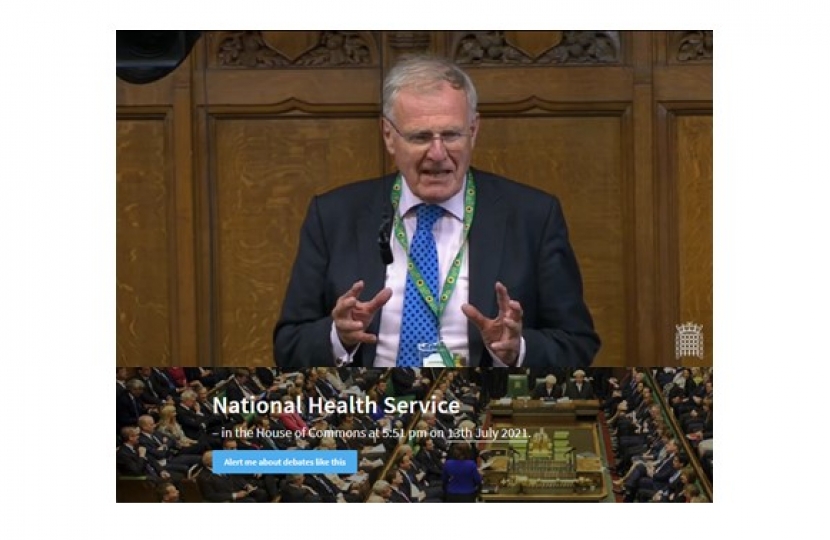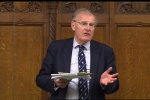
Chris Chope Raises Significant Matters around and in the NHS Debate
In the previous debate:
Christopher Chope Conservative, Christchurch 4:05 pm, 13th July 2021
On a point of order, Madam Deputy Speaker. I hope you can help us. In the debate after the next one, we are discussing the regulations that the Government have brought forward that will deprive thousands of people who work in our care homes of the right to work and not give them any compensation. The Government said on 22 June that alongside the statutory instrument they were laying an explanatory memorandum together with an impact assessment. The impact assessment has not been laid. Yesterday I raised this issue and referred to the fact that the Department of Health and Social Care had written to the Library to say, “The impact assessment has not been laid yet. We will be laying it at the earliest opportunity.” That was at midday yesterday. I have recently spoken to people in the Vote Office and they say that they have now been informed by the Department that this impact assessment will not be laid before the debate. So either it does not exist and there was a fault when it was asserted that it did, or it has been suppressed because it does not fit in with the Government’s agenda. In any event, is it open to you to put pressure on the Government to withdraw that item of business until we have an impact assessment?
Rosie Winterton Deputy Speaker (First Deputy Chairman of Ways and Means)
I thank the hon. Gentleman for his point of order and for giving me advance notice of it. No, I cannot ask the Government to withdraw the motion and the business statement that has been agreed to, but I do share his disappointment that the document has not been made available before the debate after next. I hope that it will be fed back from those on the Treasury Bench that the Minister should address the issue in her opening remarks in the debate.
William Wragg Chair, Public Administration and Constitutional Affairs Committee, Chair, Public Administration and Constitutional Affairs Committee
Further to that point of order, Madam Deputy Speaker. I have recently been on a four-colleague call with the Care Minister where she confirmed to us that the said impact assessment would not be made available until after the debate. That strikes me as a rather back-to-front approach. I just provide that clarity to the House.
Rosie Winterton Deputy Speaker (First Deputy Chairman of Ways and Means)
I am grateful to the hon. Member for that clarity. It is what we rather suspected, and what I was trying to hint at, in that it was not going to be ready but the Minister would address that in her remarks when she opens the debate.
Christopher Chope Conservative, Christchurch
Further to that point of order, Madam Deputy Speaker. Given what my hon. Friend has said, it is available and it could be made available immediately, but the Government are choosing not to make it available until after the event.
Rosie Winterton Deputy Speaker (First Deputy Chairman of Ways and Means)
The hon. Gentleman has reinforced his point that if it is available it could be made available before the debate. We understand that it is not going to be, but, as I say, we will pass back the very strong feeling that the Minister should address why that is the case in her opening remarks.
-
Later in the NHS Debate itself:
Christopher Chope Conservative, Christchurch
On a point of order, Mr Deputy Speaker. I raised a point of order earlier this afternoon about the lack of an impact assessment before the House, despite it having been referred to on 22 June as having been made available. I was informed during the course of that point of order that pressure was going to be put on the Government to explain why there was no impact assessment. It is therefore a source of great disappointment that the Minister has not started off her speech with such an apology and explanation.
Nigel Evans Deputy Speaker (Second Deputy Chairman of Ways and Means)
Thank you for that point of order, Sir Christopher. The Minister is on her feet and she looks as if she may respond to that point of order herself, as it is not a point for the Chair.
-
Later in the same debate:
Christopher Chope Conservative, Christchurch
Further to that point of order, Mr Deputy Speaker. Yesterday, I asked the House of Commons Library to inquire of the Department where this impact assessment was, and the Department informed the Library that it was about to present the impact assessment. It did not say that the assessment was still under preparation. The implication was that it was ready to be given to the House and it was just a matter of time—they said they would do it as soon as possible.
Nigel Evans Deputy Speaker (Second Deputy Chairman of Ways and Means)
Again, I can only say what I have heard during the debate and apparently the impact assessment is simply not available. This is clearly not the best situation. We can see exactly what it is, but it is what it is.
Helen Whately Minister of State (Department of Health and Social Care)
Thank you, Mr Deputy Speaker.
The Scientific Advisory Group for Emergencies recommends that 80% of staff and 90% of residents should be vaccinated in any care home, at a minimum, to provide protection against outbreaks of covid. While the majority of care home workers have now been vaccinated, our most recent data has told us that only 65% of older-age care homes in England were meeting that safe minimum level, and the figure fell to 44% in London. That is why the instrument is being put forward today. It means that, by November, subject to parliamentary approval and a subsequent 16-week grace period, anyone entering a Care Quality Commission-registered care home in England must be vaccinated unless an exemption applies. That will apply to all workers employed by the care home, those employed by an agency and volunteers in the care home. Those entering care homes to undertake other work, for example, healthcare workers, tradespeople, hairdressers and CQC inspectors, will all have to follow the regulations.
The introduction of this policy has not been taken lightly. We have consulted extensively, including with a wide range of valued stakeholders, and used their feedback to inform this legislation. We recognise that some people feel that workers should have freedom of choice about vaccination, while others do it as a duty of care to protect the people most at risk. I know from speaking directly to people who receive care and to those who have relatives living in care homes that, although they might not be sure about requiring all care workers to be vaccinated, they are sure that they, individually, want to be cared for by someone who has been fully vaccinated. Many people have little choice about who cares for them.
-
Later in the same debate:
Christopher Chope Conservative, Christchurch 6:29 pm, 13th July 2021
It is a pleasure to follow Dr Allin-Khan. I am delighted that the Official Opposition share my view and that of many of my colleagues that these are bad regulations and that they should be opposed this evening.
Both the Welsh and Scottish Governments, as I understand it, are against this type of regulation. The Minister told us that other Administrations were watching, but this Administration should be watching what the other Administrations are doing and following their lead. I must say that this was probably the most depressing performance from a Minister that I have listened to in this House. She showed a cavalier disregard for the conventions and courtesies of this House, and, as she has admitted to, she completely breached the rules under the Government’s better regulation framework, which is designed to inform decision making for regulations that affect businesses and individuals in this country. When criticised, the Minister’s response is best described as dumb insolence, and that is just not good enough. One question that I would have liked to ask in an intervention was: what is the Government’s rationale for not requiring care home residents to be vaccinated?
These regulations were laid on 22 June. There was an accompanying explanatory memorandum that expressly referenced a full impact assessment. It said:
“A full impact assessment of the costs and benefits of this instrument is available from the Department of Health and Social Care…and is published alongside this instrument and its Explanatory Memorandum”.
The Minister has not explained what has happened to it, whether it ever existed, and whether it contained information that she found embarrassing and has therefore been suppressed.
An impact assessment is not an optional extra. As the Secondary Legislation Scrutiny Committee made clear in its report of 6 July: “An impact assessment is a fundamental tool for those who wish to scrutinise legislation before nodding it through”. Indeed, an impact assessment should be cleared by the Minister before the proposals are brought forward. The Government’s better regulation framework principles, set out in March 2020, says:
“Where government intervention requires a legislative or policy change to be made, departments are expected to analyse and assess the impact of the change on the different groups affected – which should generally take the form of an impact assessment.”
That has not happened. Why has it not happened? I put down some parliamentary questions about this, because I feared that we would not get the impact assessment, and those questions have received holding answers rather than substantive answers. One asked what estimate he has made
“of the number of employees in…England who will face dismissal from their employment as a result of the enactment of regulations …and whether those staff will be eligible for compensation”.
There was not an answer to that, and there has not been one so far today. I then asked what estimate has been made
“of the number of staff employed in care homes in England who have not been vaccinated against covid-19 for (a) clinical reasons and (b) reasons of personal choice including religion, belief and conscience”.
Again, no answers—not even to parliamentary questions. How can we hold the Government to account if they will not even answer our questions?
My constituents are absolutely livid about what is being proposed. I will not quote extensively from a letter that I received from Mr Davis from Ferndown, but he says that it is completely wrong and unethical and that it makes no sense. An NHS consultant in Christchurch says that, “Mandatory vaccination would be crossing the Rubicon on medical choice, medical confidentiality and bodily autonomy.” These are vital elements of the right to privacy. A Christchurch care home manager to whom I have spoken has said that the whole proposal “undermines” the need for parity of esteem between care workers and NHS workers.
You may have seen, Madam Deputy Speaker, the article in the British Medical Journal on 8 July, which says that, while it may reduce the risk of transmission, vaccination
“is not a panacea for safety”.
Why are we not saying that people who have had previous infection and got immunity from that are exempt from these regulations? I think that this is an unnecessary, disproportionate and misguided proposal. I hope that, given what has happened in Scotland and Wales, we reject these regulations and put the Minister out of her misery.
Philippa Whitford Shadow SNP Spokesperson (Health and Social Care), Shadow SNP Spokesperson (Europe) 6:34 pm, 13th July 2021
I do not usually speak in the debates about statutory instruments on covid regulations as they apply only in England, but I feel I have to make a couple of points on the plan to make covid vaccination mandatory for all care home staff—the first mandatory vaccination legislation in the UK for well over a century.
As chair of the all-party parliamentary group on vaccinations for all, I totally support vaccination and I draw attention to our recent report, published in May, on how to improve the uptake of all vaccines. Virtually all our expert contributors highlighted the dangers of making vaccination legally mandatory because while it may force uptake among some, it tends to increase distrust and suspicion of vaccines and drive those who are hesitant to become vaccine refusers.
In Scotland, virtually 100% of care home staff are fully vaccinated with both doses, without mandating it. That has been achieved through three key policy approaches. First, as part of developing caring as a profession, care home staff in Scotland are now registered, which means we have information on who we are trying to reach. Secondly, when the Scottish Government became aware that care home staff were being deliberately targeted with disinformation on covid vaccines, they arranged expert webinars for staff with our chief medical officers and NHS director. Thirdly, as soon as the Pfizer vaccine became available in December, care home staff were vaccinated at the same visit as residents. That not only improved convenience, but created a strong sense of solidarity between colleagues and with the vulnerable people they care for.
The Scottish Government faced considerable criticism at the start of the year for spending so much time and effort on care homes rather than pushing ahead with mass vaccination centres, but it has paid off. We hear that in England, 86% of care home staff have received a first dose and 75% are fully vaccinated, although I understand that that hides a wide variation in uptake. While repeat visits have now been provided to care homes in England, that was not national policy at the start of the programme when many providers reported difficulty in accessing vaccine appointments for their staff.
The UK Government have never taken forward the principle of care staff registration and professionalisation in the care sector. As has been highlighted, staff in England are not even paid the real living wage. Care home staff have faced a very difficult time in the last 18 months and we all owe them a great debt of thanks. I still believe that locally targeted support, information and persuasion would be more successful in convincing care home staff than heavy-handed legislation, which threatens their jobs.
We all agree about the need to get the highest rate of vaccination possible to protect care home residents. The difference is in how to get there. Our APPG report makes it clear that the most important approach when dealing with communities with hesitancy is not to make assumptions about the cause but to listen to them and then act on what they are seeking.
Apart from my concerns about the principle of mandating vaccination, I call on the Minister to clarify that the legislation applies to England only. The Scottish Government do not accept the principle of making vaccines mandatory, nor do they see the need for such an approach after the fantastic uptake by our care home staff.
- ENDS -







